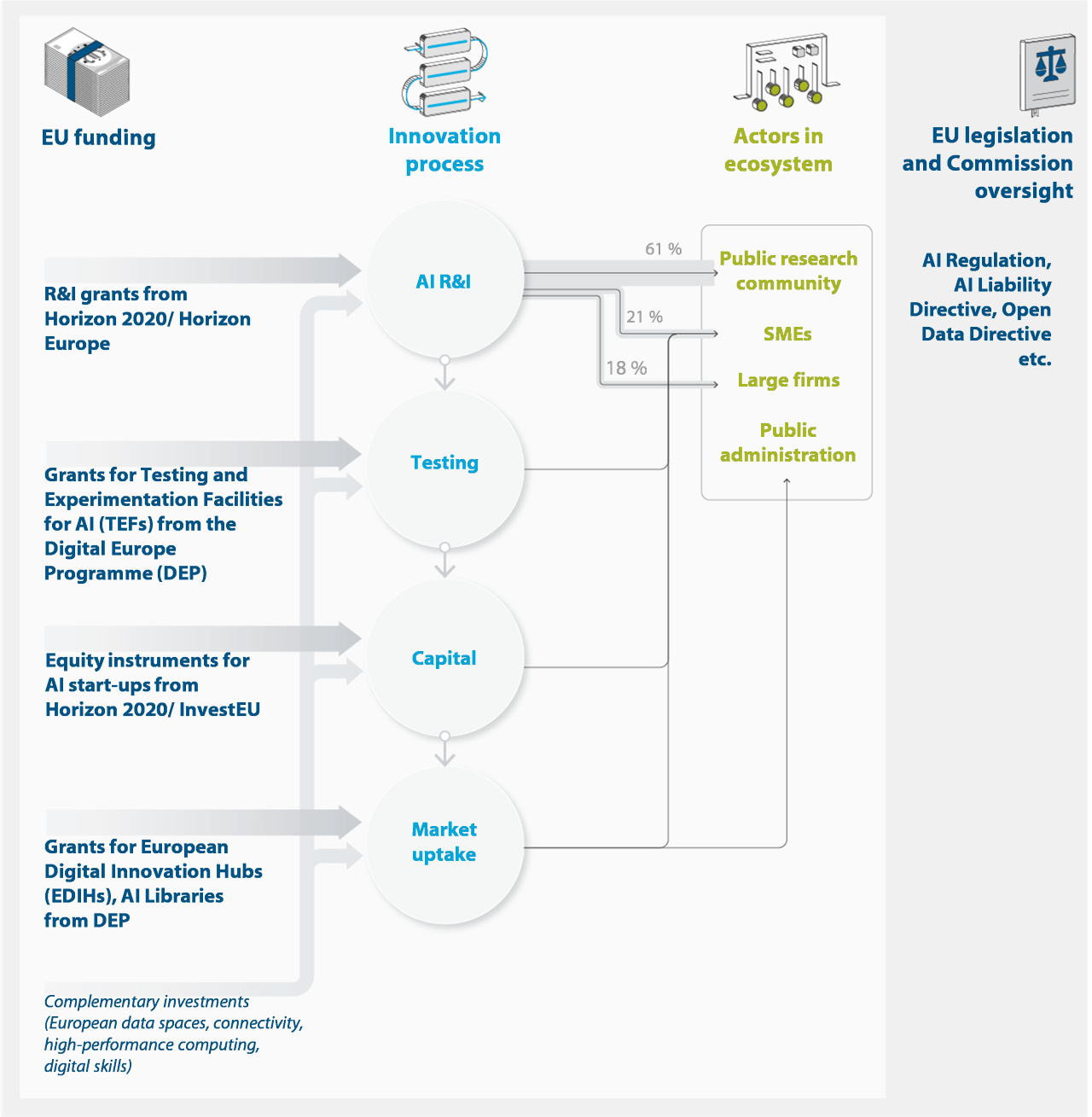Luxembourg, 29 May 2024
- EU AI investment is not keeping pace with global leaders
- Results of EU-funded AI projects are not systematically monitored
- Coordination between EU and member states is ineffective due to a lack of governance tools
The EU has so far had little success in developing Europe’s artificial intelligence ecosystem, and has failed to accelerate AI investment on a par with global leaders, according to a report by the European Court of Auditors. Since 2018, the European Commission has taken multiple actions and worked on key building blocks to advance the EU’s AI ecosystem, such as regulation, infrastructure, research, and investment. In addition, the EU took early steps to explore AI risks, leading to the world’s first general rules on AI use. However, EU measures were not well coordinated with those of the member states, and monitoring of investment was not systematic. Going forward, stronger governance and more – and better targeted – public and private investment in the EU will be paramount if the EU is to achieve its AI ambitions.
The EU faces challenges in the global race for AI investment. Since 2015, venture capital investments have been lower than in the other AI-leading regions: the United States and China. According to estimates, the overall AI investment gap between the US and the EU more than doubled between 2018 and 2020 (with the EU trailing by more than €10 billion). Against this backdrop, the EU has gradually taken steps to develop a framework for coordinating AI across the bloc by scaling up investment and adapting regulation. In 2018 and 2021, the Commission and the EU’s member states agreed on measures to develop an AI ecosystem of excellence and trust, which would set the EU on the path of a global leader in cutting-edge, ethical, and secure AI.
“Sizeable and focused AI investment is a game-changer in setting the speed of EU economic growth in the years to come,” said ECA Member Mihails Kozlovs who led the audit. In the AI race, there is a risk that the winner takes it all. If the EU wishes to succeed in its ambition, the European Commission and the member states must join forces more effectively, pick up the pace, and unlock the EU’s potential to succeed in this ongoing major technological revolution.”
The Commission’s 2018 and 2021 AI plans are comprehensive, and broadly in line with international best practices. However, more than five years after the first plan, the framework for coordinating and regulating EU investment in AI is still a work in progress. The auditors are critical of the Commission’s coordination with member states, which has had only “limited effects”. This was because the executive lacked the necessary governance tools and information. The credibility of EU plans suffered further as the Commission had not set up a proper system for monitoring how AI investments perform. Nor was it clear how the member states would contribute to overall EU investment targets, meaning that there has been no EU overview.
The EU’s investment targets remain too vague and outdated: they have not changed since 2018, and the lack of ambition for investment targets contrasts with the objective of building a globally competitive AI ecosystem. Although the Commission generally managed to scale up EU budget spending on AI research projects, it did not significantly boost private co-financing. The Commission also has to do more to ensure that the results of EU-funded research projects in AI are fully commercialised or exploited.
The Commission took action to put financial and infrastructure enablers in place for AI development and uptake. However, EU-funded infrastructure – such as testing facilities, data spaces, or an AI-on-demand platform – has been slow to get off the ground. Indeed, AI plans have so far triggered only modest EU capital support (such as equity financing) for innovators. The recent EU measures to achieve a single market for data are still at the inception phase, and cannot immediately boost AI investment.
Background information
AI encompasses emerging technologies in fast-evolving areas including robotics, big data and cloud computing, high-performance computing, photonics, and neuroscience. The US has long been a front runner in AI, while China plans to become the global AI leader by 2030, with both countries relying on substantial private investment through their tech giants. The EU’s AI targets for public and private investment were €20 billion over the 2018-2020 period, and €20 billion each year over the following decade; the Commission set out to increase EU AI funding to €1.5 billion in the 2018-2020 period and €1 billion per year in 2021-2027. The share of businesses in the EU using AI differs significantly between member states. France and Germany have announced the largest public AI investments, while four countries are still without any AI strategies at all. The EU has an ambitious target of reaching 75 % of firms using AI by 2030. In 2021, Europe and Central Asia were together responsible for only 4 % of AI patent filings worldwide.
Special report 08/2024, “EU Artificial Intelligence ambition: stronger governance and increased, more focused investment essential going forward”,” is available on the ECA website. The AI Act agreed recently was not within the audit scope. On 14 June 2024, the ECA will hold an online panel debate on the EU’s AI ambitions; livestreaming will be available.
EU Commission replies
Source – ECA

